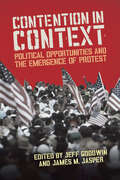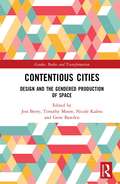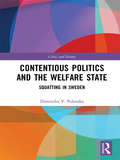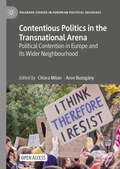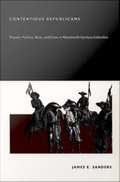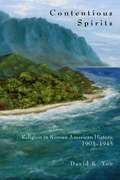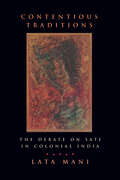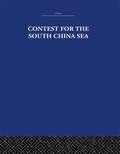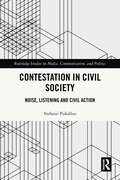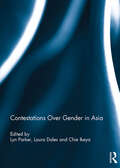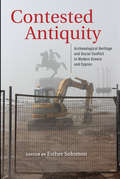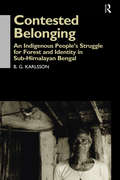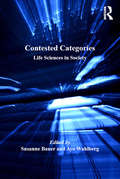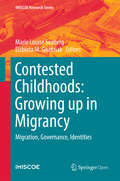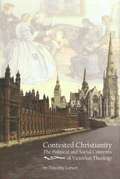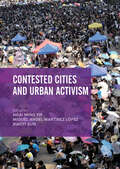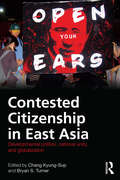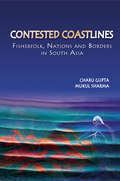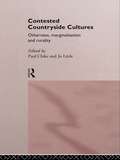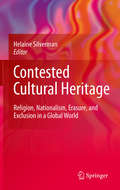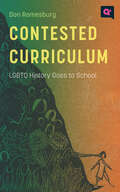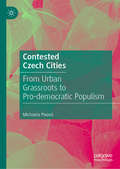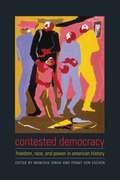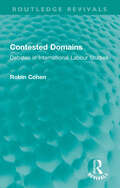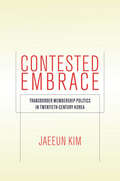- Table View
- List View
Contention in Context
by Jeff Goodwin James M. JasperDespite extensive theoretical debates over the utility of "political opportunities" as an explanation for the rise and success of social movements, there have been surprisingly few serious empirical tests. Contention in Context provides the most extensive effort to date to test the model, analyzing a range of important cases of revolutions and protest movements to identify the role of political opportunities in the rise of political contention. With evidence from more than fifty cases, this book explores the role of the state in protest, the frequent overemphasis on political opportunities in recent research, and the extent to which opportunity models ignore the cultural and emotional triggers for collective action. By examining new directions in the study of protest and contention, this book shows that although political opportunities can help explain the emergence of certain kinds of movements, a new strategic language can ultimately tell us far more.
Contentious Cities: Design and the Gendered Production of Space (Gender, Bodies and Transformation)
by Jess Berry Nicole Kalms Timothy Moore Gene BawdenContentious Cities offers unique interdisciplinary approaches to understanding gendered spatial equity in the urban environment. Positioning design as a central component in how cities produce, construct, represent and materialise gendered spatial practices, it brings together practice and theory to critique, question and enable solutions that challenge the root causes of gender inequalities in cities. Through a rich array of case-studies, practice-led interventions, and historical and theoretical perspectives, it examines important issues that affect the ways in which women, and people of diverse gender and sexual identities experience and participate in cities. Thematically organised, it considers problems of street-harassment, heterosexualisation and equity in access and mobility, together with modes of segregation, isolation and discrimination, as well as processes of resistance, intervention and agency. Grounded in feminist and queer methods of analysis, the book offers new insights regarding the representation of cities, the lived experience of cities, and how design-tactics and approaches might affect the ways cities shape and regulate how women and people of diverse gender and sexual identity inhabit, occupy and move through the city. An examination of the ways in which design might shift toward safer and more inclusive cities, Contentious Cities will appeal to scholars of sociology, gender studies and urban studies, as well as those working in the fields of urban planning and design.
Contentious Politics and the Welfare State: Squatting in Sweden (Cities and Society)
by Dominika V. PolanskaThis book outlines the history of squatting in Sweden and analyzes the conditions under which squatting has intensified and declined in the country between 1968 and 2017. With close attention to the relationship between civil society and the state in the Swedish context, and the manner in which this relationship, together with attendant political, media and movement-based discourses, shapes the possibilities that exist for collective action, the author draws on two key concepts – those of the narrative of consensus and discourse – to present an analysis of squatting as a form of contentious politics and the “successful” story of civil society development as decisive for its emergence and development in the country. A study of the way in which confrontational actors question both the property relations inherent in capitalism and the authority of the welfare state and its institutions, Contentious Politics and the Welfare State will appeal to social scientists with interests in urban studies, political sociology, squatting, social movements and the relationship between the welfare state and contentious social actors.
Contentious Politics in the Transnational Arena: Political Contention in Europe and its Wider Neighbourhood (Palgrave Studies in European Political Sociology)
by Chiara Milan Aron BuzogányThis Open Access book investigates the transnational dimension of activism — exploring how and why non-state actors scale up contention from the local to the transnational arena, how they translate their grievances and claims into the transnational arena, and how they organize across borders. Moving beyond the analysis of individual campaigns, or a single-country or single-issue focus, which are already well represented in the literature, this volume takes a comprehensive approach. It investigates transnational activities across various policy fields and their respective transnational arenas of contention — namely migration, labour struggles, human rights, and environmental/climate justice — across a range of geographic contexts. Drawing on extensive fieldwork, the contributions in this volume examine cases of transnational contention spanning the EU and its broader neighborhood, from the Western Balkans to the South Caucasus and the Mediterranean. Focusing on European spaces as the arena where civil society actors mobilize, this volume offers insights into their diverse repertoires of contention and discursive strategies, and how they refer to the European Union as the direct or indirect target of their claims. Key cases include grassroots movements, NGO campaigns, pro-European forces, Eurosceptic parties, healthcare and climate justice activism, and the organizational dynamics surrounding migration-related contentious politics. Offering guidelines for future research on civil society actors in the EU and its neighbourhood, this volume is essential reading for scholars and students of political sociology, political science, European studies, as well as practitioners and policy makers concerned with the future of civil society activism in the transnational arena.
Contentious Republicans: Popular Politics, Race, and Class in Nineteenth-Century Colombia
by James E. SandersContentious Republicans explores the mid-nineteenth-century rise of mass electoral democracy in the southwestern region of Colombia, a country many assume has never had a meaningful democracy of any sort. James E. Sanders describes a surprisingly rich republicanism characterized by legal rights and popular participation, and he explains how this vibrant political culture was created largely by competing subaltern groups seeking to claim their rights as citizens and their place in the political sphere. Moving beyond the many studies of nineteenth-century nation building that focus on one segment of society, Contentious Republicans examines the political activism of three distinct social and racial groups: Afro-Colombians, Indians, and white peasant migrants. Beginning in the late 1840s, subaltern groups entered the political arena to forge alliances, both temporary and enduring, with the elite Liberal and Conservative Parties. In the process, each group formed its own political discourses and reframed republicanism to suit its distinct needs. These popular liberals and popular conservatives bargained for the parties' support and deployed a broad repertoire of political actions, including voting, demonstrations, petitions, strikes, boycotts, and armed struggle. By the 1880s, though, many wealthy Colombians of both parties blamed popular political engagement for social disorder and economic failure, and they successfully restricted lower-class participation in politics. Sanders suggests that these reactionary developments contributed to the violence and unrest afflicting modern Colombia. Yet in illuminating the country's legacy of participatory politics in the nineteenth century, he shows that the current situation is neither inevitable nor eternal.
Contentious Spirits: Religion in Korean American History, 1903-1945
by David YooThis is the first book-length study of religion in the early history of Korean immigrants and their descendants in the United States. Yoo (history, Claremont McKenna College) focuses on the Protestant experience in the greater Honolulu and Los Angeles areas for the period 1903 to 1945. He builds his analysis on the themes of religion and the racialization of Koreans in the US, the impact of religion on networks of migration and exile, and issues of colonialism and independence in Korea and the US. Annotation ©2010 Book News, Inc. , Portland, OR (booknews. com)
Contentious Traditions: The Debate on Sati in Colonial India
by Lata ManiContentious Traditions analyzes the debate on sati, or widow burning, in colonial India. Though the prohibition of widow burning in 1829 was heralded as a key step forward for women's emancipation in modern India, Lata Mani argues that the women who were burned were marginal to the debate and that the controversy was over definitions of Hindu tradition, the place of ritual in religious worship, the civilizing missions of colonialism and evangelism, and the proper role of the colonial state. Mani radically revises colonialist as well as nationalist historiography on the social reform of women's status in the colonial period and clarifies the complex and contradictory character of missionary writings on India.The history of widow burning is one of paradox. While the chief players in the debate argued over the religious basis of sati and the fine points of scriptural interpretation, the testimonials of women at the funeral pyres consistently addressed the material hardships and societal expectations attached to widowhood. And although historiography has traditionally emphasized the colonial horror of sati, a fascinated ambivalence toward the practice suffused official discussions. The debate normalized the violence of sati and supported the misconception that it was a voluntary act of wifely devotion.Mani brilliantly illustrates how situated feminism and discourse analysis compel a rewriting of history, thus destabilizing the ways we are accustomed to look at women and men, at "tradition," custom, and modernity.
Contest for the South China Sea
by Marwyn SamuelsFirst published in 1982. Wide-ranging and fully documented, this book is the first detailed study of the origins, contexts and consequences of the long-standing dispute between China, Taiwan, Vietnam and the Philippines over the Paracel and Spratly Archipelagos in the South China Sea - one of the world's most strategically important inter-ocean basins and China's southern maritime frontier. Samuels' analysis: * Highlights the impact of the shifting balance of power in Asia and the growing competition for oceanic resources * Examines the implications of the dispute in terms of the historical and modern role of china as a maritime power in Asia.
Contestation in Civil Society: Noise, Listening and Civil Action (Routledge Studies in Media, Communication, and Politics)
by Stefanie PukallusContestation in Civil Society looks at the dynamic relationship between noise, listening and civil action as the key to understanding how societies communicatively make decisions about their internal and external boundaries.By focusing on the three components of noise, listening and civil action, the book moves attention away from an exclusive focus on what is being communicated – the communicator, the statement, the speech and so on. It argues that what is being communicated – the noise – does not lead in and of itself to civil action but rather that the audience – the listeners – plays a crucial role in determining what the noise means, whether it is judged legitimate or not and whether any civil action should be taken.Exploring how the relationship between noise, listening and civil action plays out within the context of contestation will interest academics and scholars of political studies, political philosophy, communication, sociology, media and cultural studies.
Contestations Over Gender in Asia
by Lyn Parker, Laura Dales and Chie IkeyaThis book brings together the work of scholars from around the world in a consideration of how gender is contested in various parts of Asia – in China, India, Indonesia, Japan, and the Philippines. Part I of this collection explores notions of agency in relation to women’s domestic and everyday lives. While ‘agency’ is one of the key terms in contemporary social science, scholarship on women in Asia recently has focussed on women’s political activism. Women’s private lives have been neglected in this new scholarship. This volume has a special focus on women’s relational and emotional lives, domestic practices, marriage, singlehood and maternity. Papers consider how women negotiate enhanced space and reputations, challenging negative representations and entrenched models of intra-family and intimate relations. There is also a warning about too free feminist expectations of agency and the repercussions of the exercise of agency.The three essays in Part II examine the historical construction of masculinities in colonial and postcolonial South and Southeast Asia, and the ways that manhood is interpreted, experienced and performed in daily life in the past and in present times. They highlight the centrality and continued relevance of masculinity to analyses of empire and nation and underscore the highly gendered and (hetero)sexualized nature of political, military, and economic institutions. Collectively, the essays explore a wide range of competing articulations and experiences of gender within Asia, emphasising the historical and contemporary plurality and variability of femininity and masculinity, and the dynamic and intersectional nature of gender identities and relations.This book was published as a special issue of Asian Studies Review.
Contested Antiquity: Archaeological Heritage and Social Conflict in Modern Greece and Cyprus (New Anthropologies of Europe)
by Dimitris Plantzos Alexandra Bounia Theopisti Stylianou-Lambert Eleana Yalouri Marlen Mouliou Aris Anagnostopoulos Paulina Nikolaou Styliana Galinki Andromache Gazi Katerina Konstantinou Niki Sakka Eleni Stefanou Ioanna Antoniadou Elpida RikouWhile the archaeological legacies of Greece and Cyprus are often considered to represent some of the highest values of Western civilization—democracy, progress, aesthetic harmony, and rationalism—this much adored and heavily touristed heritage can quickly become the stage for clashes over identity and memory. In Contested Antiquity, Esther Solomon curates explorations of how those who safeguard cultural heritage are confronted with the best ways to represent this heritage responsibly. How should visitors be introduced to an ancient Byzantine fortification that still holds the grim reminders of the cruel prison it was used as until the 1980s? How can foreign archaeological institutes engage with another nation's heritage in a meaningful way? What role do locals have in determining what is sacred, and can this sense of the sacred extend beyond buildings to the surrounding land? Together, the essays featured in Contested Antiquity offer fresh insights into the ways ancient heritage is negotiated for modern times.
Contested Belonging: An Indigenous People's Struggle for Forest and Identity in Sub-Himalayan Bengal
by B. G. KarlssonDeals with the modern predicament of the Rabha (or Kocha) people, one of India;s indigenous peoples, traditionally practising shifting cultivation in the jungle tracts situated where the Himalayan mountains meet the plains of Bengal. When the area came under British rule and was converted into tea gardens and reserved forests, Rabhas were forced to become labourers under the forest department. Today, large-scale illegal deforestation and the global interest in wildlife conservation once again jeopardize their survival. Karlsson describes the development of the Rabha people, their ways of coping with the colonial regime of scientific forestry and the depletion of the forest, as well as with present day concerns for wilderness and wildlife restoration and preservation. Central points relate to the construction of identity as a form of subaltern resistance, the Rabha;s ongoing conversion to Christianity and their ethnic mobilisation, and the agency involved in the construction of cultural or ethnic identities.
Contested Categories: Life Sciences in Society (Theory, Technology and Society)
by Ayo Wahlberg Susanne BauerDrawing on social science perspectives, Contested Categories presents a series of empirical studies that engage with the often shifting and day-to-day realities of life sciences categories. In doing so, it shows how such categories remain contested and dynamic, and that the boundaries they create are subject to negotiation as well as re-configuration and re-stabilization processes. Organized around the themes of biological substances and objects, personhood and the genomic body and the creation and dispersion of knowledge, each of the volume’s chapters reveals the elusive nature of fixity with regard to life science categories. With contributions from an international team of scholars, this book will be essential reading for anyone interested in the social, legal, policy and ethical implications of science and technology and the life sciences.
Contested Childhoods: Migration, Governance, Identities (IMISCOE Research Series)
by Elżbieta M. Goździak Marie Louise SeebergThis book is open access under a CC BY-NC 2. 5 license. This book explores specific migration, governance, and identity processes currently involving children and ideas of childhood. Migrancy as a social space allows majority populations to question the capabilities of migrants, and is a space in which an increasing number of children are growing up. In this space, families, nation-states, civil society, as well as children themselves are central actors engaged in contesting the meaning of childhood. Childhood is a field of conceptual, moral and political contestation, where the 'battles' may range from minor tensions and everyday negotiations of symbolic or practical importance involving a limited number of people, to open conflicts involving violence and law enforcement. The chapters demonstrate the importance of how we understand phenomena involving children: when children are trafficked, seeking refuge, taken into custody, active in gangs or in youth organisations, and struggling with identity work. This book examines countries representing very different engagements and policies regarding migrancy and children. As a result, readers are presented with a comprehensive volume ideal for both the classroom and for policy-makers and practitioners. The chapters are written by experts in social anthropology, human geography, political science, sociology, and psychology.
Contested Christianity: The Political and Social Contexts of Victorian Theology
by Timothy LarsenFrom a location in nineteenth-century England, this study seeks to shed fresh light on a range of subjects by introducing new conversation partners into a variety of discussions. The orientating discipline is religious history, more specifically the history of Christianity--and the other side of that coin in Victorian currency the history of religious skepticism. Nevertheless, religious history is explored in this volume at its crossroads with other fields, both in religious studies (especially biblical studies and historical theology) and in historical studies, notably political, intellectual, social, cultural, and women's history. This book is comprised of both original and previously published material.
Contested Cities and Urban Activism (The Contemporary City)
by Ngai Ming Yip Miguel Angel Martínez López Xiaoyi SunThis edited volume advances our understanding of urban activism beyond the social movement theorization dominated by thesis of political opportunity structure and resource mobilization, as well as by research based on experience from the global north. Covering a diversity of urban actions from a broad range of countries in both hemispheres as well as the global north and global south, this unique collection notably focuses on non-institutionalised or localised urban actions that have the potential to bring about radical structural transformation of the urban system and also addresses actions in authoritarian regimes that are too sensitive to call themselves “movement”. It addresses localized issues cut off from international movements such as collective consumption issues, like clean water, basic shelter, actions against displacement or proper venues for street vendors, and argues that the integration of the actions in cities in the global south with the specificity of their local social and political environment is as pivotal as their connection with global movement networks or international NGOs. A key read for researchers and policy makers cutting across the fields of urban sociology, political science, public policy, geography, regional studies and housing studies, this text provides an interdisciplinary and international perspective on 21st century urban activism in the global north and south.
Contested Citizenship in East Asia: Developmental Politics, National Unity, and Globalization (Routledge Advances in Sociology)
by Bryan S. Turner Chang Kyung-SupTheories of citizenship from the West – pre-eminently those by T.H. Marshall – provide only a limited insight into East Asian political history. The Marshallian trajectory – juridical, political and social rights – was not repeated in Asia and the late nineteenth-century debate about liberalism and citizenship among intellectuals in Japan and China was eventually stifled by war, colonialism and authoritarian governments (both nationalist and communist). Subsequent attempts to import western-style democratic values and citizenship were to a large extent failures. Social rights have rarely been systematically incorporated into the political ideology and administrative framework of ruling governments. In reality, the predominant concern of both the state elite and the ordinary citizens was economic development and a modicum of material well-being rather than civil liberties. The developmental state and its politics take precedence in the everyday political process of most East Asian societies. These essays provide a systematic and comparative account of the tensions between rapid economic growth and citizenship, and the ways in which those tensions are played out in civil society.
Contested Coastlines: Fisherfolk, Nations and Borders in South Asia
by Charu Gupta Mukul SharmaThis book is about the tragic journeys and livelihood insecurities of coastal fisherfolk jailed by India, Pakistan, Sri Lanka and Bangladesh for having entered each other’s territorial waters. While reflecting on national anxieties and the deleterious politics of boundaries, it reveals how these fisherfolk create alternative maps and a new world of ‘debordering’. These fishworkers and coastal conflicts have been subjects of everyday news, but never a subject of serious study. A first of its kind, the present book breaks new ground by examining the journeys of these fisherfolk and coastal conflicts in South Asia from several overlapping but distinct perspectives: declining sea resources, security and border anxieties, suffering of the fisherfolk, their ambiguous identities and transnational movements. The book is also innovative in terms of methodology: it is fisherfolk-centric as it marginalizes the concerns of the state from the perspective of security; it questions the very basis of security and argues for a shift in its perspective.
Contested Countryside Cultures: Rurality and Socio-cultural Marginalisation
by Paul Cloke Jo LittleThis book examines the 'other' side of the countryside, a place also inhabited (and visited) by women, children, teenagers, the elderly, gay men and lesbians, black and ethnic minorities, the unemployed and the poor. These groups have remained largely excluded by both rural policies and the representations of rural culture. The book charts the experiences of these marginalised groups and sets this exploration within the context of postmodern, poststructuralist, postcolonial and late feminist analysis. This theoretical framework reveals how notions of the rural have been created to reflect and reinforce divisions amongst those living in the countryside.
Contested Cultural: Religion, Nationalism, Erasure, and Exclusion in a Global World
by Helaine SilvermanCultural heritage is material - tangible and intangible - that signifies a culture's history or legacy. It has become a venue for contestation, ranging in scale from protesting to violently claimed and destroyed. But who defines what is to be preserved and what is to be erased? As cultural heritage becomes increasingly significant across the world, the number of issues for critical analysis and, hopefully, mediation, arise. The issue stems from various groups: religious, ethnic, national, political, and others come together to claim, appropriate, use, exclude, or erase markers and manifestations of their own and others' cultural heritage as a means for asserting, defending, or denying critical claims to power, land, and legitimacy. Can cultural heritage be well managed and promoted while at the same time kept within parameters so as to diminish contestation? The cases herein rage from Greece, Spain, Egypt, the UK, Syria, Zimbabwe, Italy, the Balkans, Bénin, and Central America.
Contested Curriculum: LGBTQ History Goes to School (Q+ Public)
by Don RomesburgToday, many states have proposed so-called “Don’t Say Gay” bills that prohibit public school teachers from mentioning LGBTQ topics in the classroom. But a few states, like California, have taken decisive steps in the other direction. They mandate inclusive education that treats LGBTQ history as essential to the curriculum. At once a history of an evolving movement and an activist handbook, Contested Curriculum navigates the rocky path to LGBTQ-inclusive K–12 history education in the United States and recounts the fight for a curriculum that recognizes the value of queer and trans lives. What began in fits and starts in activism and educational materials across the late twentieth century led to the passage of California’s landmark FAIR Education Act in 2011, ensuring that LGBTQ history has a place in the K–12 classroom. Historian Don Romesburg, the lead scholar who worked with advocacy organizations to pass the act, recounts the decades-long struggle to integrate LGBTQ content into history education policy, textbooks, and classrooms. Looking at California and states that followed its lead, he assesses the challenges and opportunities presented by this new way of teaching history. Romesburg’s powerful case for LGBTQ-inclusive education is all the more urgent in this era of anti-gay book bans, regressive legislation, and attempts to diminish the vital role that inclusive and honest history education should play in a democratic nation.
Contested Czech Cities: From Urban Grassroots to Pro-democratic Populism
by Michaela PixováThis book focuses on urban grassroots movements in post-socialist Czechia and their struggle against unprofessional and nondemocratic urban processes in their cities. It shows that in the context of neoliberal urban restructuring, weakly consolidated democracy, and corporate capture of the local state, urban activists often resort to entering electoral competition as the only efficient way of improving the situation in their cities. The book is based on four case studies from different Czech cities, narrating stories of activists struggling against a controversial flood protection project, the demolition of public buildings, an unhealthy land-use plan, arrogant development, and overpriced city halls. It offers valuable insight into the obstacles created by institutionalized forms of power abuse which urban activists must deal with and discusses the pro-democratic potential of urban grassroot movements’ efforts to overcome their limited ability to influence political processes via standard means of civic engagement and protest activities.
Contested Democracy: Freedom, Race, and Power in American History
by Sinha Manisha Penny Von Eschen Eds.With essays on U.S. history ranging from the American Revolution to the dawn of the twenty-first century, Contested Democracy illuminates struggles waged over freedom and citizenship throughout the American past. Guided by a commitment to democratic citizenship and responsible scholarship, the contributors to this volume insist that rigorous engagement with history is essential to a vital democracy, particularly amid the current erosion of human rights and civil liberties within the United States and abroad. Emphasizing the contradictory ways in which freedom has developed within the United States and in the exercise of American power abroad, these essays probe challenges to American democracy through conflicts shaped by race, slavery, gender, citizenship, political economy, immigration, law, empire, and the idea of the nation state. In this volume, writers demonstrate how opposition to the expansion of democracy has shaped the American tradition as much as movements for social and political change. By foregrounding those who have been marginalized in U.S society as well as the powerful, these historians and scholars argue for an alternative vision of American freedom that confronts the limitations, failings, and contradictions of U.S. power. Their work provides crucial insight into the role of the United States in this latest age of American empire and the importance of different and oppositional visions of American democracy and freedom. At a time of intense disillusionment with U.S. politics and of increasing awareness of the costs of empire, these contributors argue that responsible historical scholarship can challenge the blatant manipulation of discourses on freedom. They call for careful and conscientious scholarship not only to illuminate contemporary problems but also to act as a bulwark against mythmaking in the service of cynical political ends.
Contested Domains: Debates in International Labour Studies
by Robin CohenOriginally published in 1991, this volume discusses the urban working class, international migrants and the so-called lumpenproletariat. The book exhibits the fruitful interaction that has taken place between sociological theory, new views of the changing world economy and the empirical realities of working class experience and struggles. The dual theme of the book is the control which the state and employers seek to impose and maintain over labouring people, and the resistance put up by workers to these often new and unacceptable disciplines. With case studies – both historical and contemporary – drawn from North America, Britain and various parts of Africa, the author develops an interlocking theory of habituation and resistance. Against the background of profound changes in the global economy, Robin Cohen explores ways in which labouring people respond to the structural and managerial constrains on the development of their class consciousness and self-organisation. This will be of interest to urban and industrial sociologists, as well as those concerned with comparative social theory and the relationship between developing world and industrialised societies.
Contested Embrace: Transborder Membership Politics in Twentieth-Century Korea
by Jaeeun KimScholars have long examined the relationship between nation-states and their "internal others," such as immigrants and ethno-racial minorities. Contested Embrace shifts the analytic focus to explore how a state relates to people it views as "external members" such as emigrants and diasporas. Specifically, Jaeeun Kim analyzes disputes over the belonging of Koreans in Japan and China, focusing on their contested relationship with the colonial and postcolonial states in the Korean peninsula. Extending the constructivist approach to nationalisms and the culturalist view of the modern state to a transnational context, Contested Embrace illuminates the political and bureaucratic construction of ethno-national populations beyond the territorial boundary of the state. Through a comparative analysis of transborder membership politics in the colonial, Cold War, and post-Cold War periods, the book shows how the configuration of geopolitics, bureaucratic techniques, and actors' agency shapes the making, unmaking, and remaking of transborder ties. Kim demonstrates that being a "homeland" state or a member of the "transborder nation" is a precarious, arduous, and revocable political achievement.
